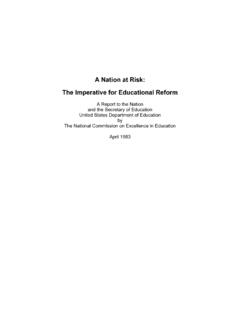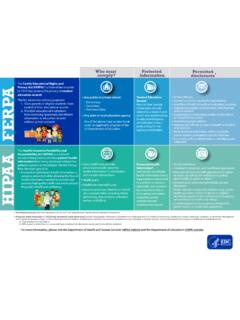Transcription of Measuring success: Evaluating educational programs
1 June 2010, Vo l u m e 7, (Serial ) US-China education Review, ISSN 1548-6613, USA 1 Measuring success : Evaluating educational programs Yael Fisher (Achva Academic College, Te l-Aviv 69121, Israel) Abstract: This paper reveals a new evaluation model, which enables educational program and project managers to evaluate their programs with a simple and easy to understand approach. The index of success model is comprised of five parameters that enable to focus on and evaluate both the implementation and results of an educational program. The integration of these parameters forms a complete and comprehensive picture, which in turn provides the most information on the success or failure of the program.
2 The parameters are: (1) the relevance index, referring to an evaluation of predefined objectives; (2) the efficiency index, referring to the fiscal efficiency of the program; (3) the effectiveness index Evaluating the attainment of the program s objectives; (4) the impact index gauging the effect on the consumers, for whom the program is undertaken; and (5) the final parameter is the program s sustainability index. Since Israel s education strategy currently leans towards site-based monitoring and evaluation, such a model can potentially be of great help to school management and staff. Key words: evaluation; site-based management; educational programs and projects; vision; policy; objectives and targets; decision-making 1.
3 Introduction How many times, after having completed a program or project, have you asked whether or not it was fruitful? You may feel content, and even be commended by a superior, but is this enough? Or, do we need clear indicators by which to judge whether or not our objectives have been met? The suggested model s strength resides in its simplicity, as it allows any project manager even one who is not a professional assessor to construct specific measures of success . Applying this model requires a clear definition of objectives and targets, as well as a coherent decision-making process, and these vital topics will be examined as well. This work is divided into two main sections. The first section takes a look at evaluation procedures generally and the evaluation of programs and projects specifically, which includes a review of relevant core terms such as vision, policy, objectives, targets, programs and project.
4 The second part of the paper outlines the index of success model , and includes operative explanations for implementing the model, as well as its pedagogical significance. 2. Literature review What is evaluation? Traditionally, evaluation within the education system is hierarchical the expert superior evaluates his/her Yael Fisher, , Achva Academic College; research fields: educational administration and policy, parental involvement. Measuring success : Evaluating educational programs 2 subordinate. Generally, a teacher evaluates a student, a principal evaluates a teacher, and an inspector evaluates a principal. Since the evaluation is determined according to the superior s preference, and for the greater part focuses on the subordinate s achievements and results, it can be regarded as arbitrary.
5 Recently an awareness has grown for the need to systematize the field of evaluation through recognizing how, when, and what to evaluate, and for what purpose. It is common to find the words measurement and evaluation used in tandem within the education system. This points to a preconception that measurement is needed for a proper evaluation, and raises the question: What is measurement and what, in the context of the education system, needs to be measured? In order to answer this question, it will first be taken a look at what evaluation is. A number of researchers have uniformly concluded that evaluation is an act that provides a relevant opinion (Nevo, 2001; Freidman, 2006; Rossi, et al., 1999). As a statement of opinion, an evaluation can be either subjective or objective.
6 Anyone looking out a window on a rainy day, and observing rays of sun forming a rainbow in the distance, will likely state that there is a rainbow in the sky . Likewise, when people say car , they all refer to a transportation vehicle. These are instances of an objective evaluation. Evaluating a work of art in a museum, on the other hand, may result in as many differing opinions and even there are critics, in what may be termed subjective evaluation. It is commonly assumed that objective evaluation is founded on systematic measurement of one procedure or another, hence the joining of the terms measurement and evaluation in education . The rationale for objectifying such an evaluation is the ability, through measurement, of comparing it to predefined standards.
7 These standards are a yardstick by which to judge the data obtained in the evaluation. In comparison, subjective evaluation relies on intuition and feeling. It is the opinion of this author that any evaluation, even a scientific one accepted in such fields as the social and physical sciences, contains within it both subjective and objective elements. Let us take a study as an example that examines the mathematical achievements of fourth graders. The results of 1,500 fourth graders, selected according to sample study guidelines, are collected. This describes quantitative (vs. qualitative) research. Typical of such studies, this one reports findings such as the percentage of students achieving high scores, low scores and so on. Since the report is a result of statistical calculations, it is considered to be objective.
8 The research paper, however, normally includes a discussion that attempts to interpret the results. This interpretation constitutes a subjective evaluation, as it is possible for two researchers to provide two different analyses for the same results. That is, when attempting to explain why the achievements of one group of fourth graders are different from another s, the interpretation will be subjective. One researcher may claim that achievements of students living in a rural region are higher than those of students living in urban regions, because calmer surroundings contribute to the students grades vis- -vis their wellbeing. Another may claim that rural results are higher because parents are more likely to take a greater role in their children s education .
9 The research findings are the same (objective) and the interpretations different (subjective), indicating the presence of both in a quantitative study. The fact is truer in a qualitative study. Nevertheless, there is a prevalent agreement that the process is an analytical one. In order to better elucidate the forthcoming model, this work will adopt Weis s (1988, p. 4) definition of evaluation: the systematic examination of the implementation or results of a program or project, including a comparison with hidden and evident standards, for the purpose of improving or deciding upon said program or project. This definition is helpful since it allows to treat evaluation as multidirectional and multidimensional, not simply as an assessment of achievement and results.
10 Weis s (1988, p. 4) definition allows to evaluate the entire Measuring success : Evaluating educational programs 3 educational spectrum, including objectives, planning, process, results and the environment and culture in which these programs take shape. The prevalent view in today s educational system is that each and every dimension of life in an educational organization is worthy of being evaluated. Unlike in the 1960s, when students alone were evaluated, now the entire staff, educational programs and organizational features are similarly subject to monitoring (Nevo, 2001). The main emphasis of evaluation is a systematic analysis with three main objectives (Nevo, 2001; Freidman, 2006): (1) To provide information on the degree to which the program or action conforms to expectations or requirements.

















